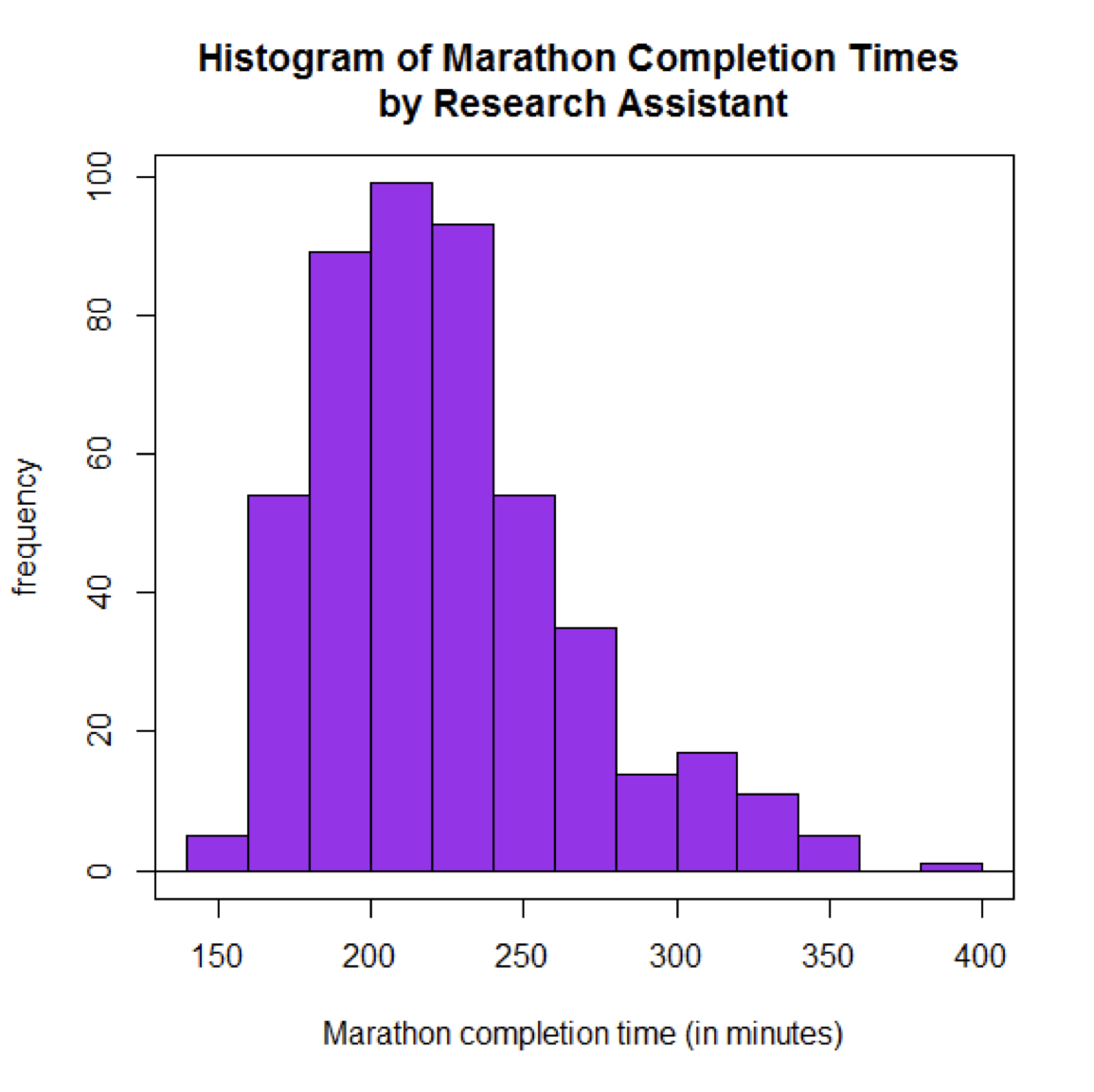Question
Question 3 Background : Marathon Runners: Carry water for the marathon? Yes or No Long races, like a marathon, have hydration stations about 2-3 miles
Question 3 Background :
Marathon Runners: Carry water for the marathon? Yes or No
Long races, like a marathon, have hydration stations about 2-3 miles apart. When it comes to getting ready for the big race, runners must decide whether the hydration stations is enough to get them through the race or whether they should carry their own supply of water. Some runners believe carrying additional weight (like a water bottle) will slow them down and therefore they decide to rely on the hydration stations along the race. To put this theory to the test, a random sample of 466 marathon runners is selected and various variables are recorded including the runners completion time in minutes (variable: runtime) and whether or not the runner carried water during the race (variable: waterload), the data set calledmarathon.Rdata contains the information from the 466 marathon runners selected at random.
Question 3 Subquestions
3.a
1 point(s)
We would like to assess if, on average, carrying a water bottle during the race slows down the marathon runner. A 5% significance level will be used. Define the parameter 1 as the population mean marathon completion time in minutes when the runner is not carrying their own water bottle and 2 as the population mean marathon completion time in minutes when the runner is carrying their own water bottle. The null hypothesis can be stated as H0: 1 = 2. Which of the following is the appropriate direction for the alternative hypothesis Ha: 1 ____ 2?
greater than (>)
less than (
not equal to ()
3.b
2 point(s)
Use R to perform the two-sample t-test. Generate both the pooled and unpooled (general) two independent samples test results. Copy and paste both sets of test results below OR save the test output as a jpg and upload it.
No answer entered. Click above to enter an answer.
3.c
1 point(s)
To help you decide which of the two test results to use, you suggest that Levene's test be conducted. Which of the following is the appropriate null hypothesis for Levenes test stated in words?
The two sample variances are equal.
The two sample variances are similar.
The two population variances are equal.
The two population variances are similar.
3.d
1 point(s)
Here are the results for Levenes test.
Rcmdr> leveneTest(marathon$runtime, marathon$waterload, center=mean) Levene's Test for Homogeneity of Variance (center = mean) Df F value Pr(>F) group 1 9.7796 0.001876 ** 464 Based on these results, which t-test results will you report?
Two independent samples general (unpooled) t-test
Two independent samples pooled t-test
3.e
2 point(s)
Report the t-test statistic value, and the p-value for the hypothesis in part (a).
No answer entered. Click above to enter an answer.
3.f
1 point(s)
What is the distribution that would be used to find the p-value for the t-test?
N(0,1)
t(464)
t(273.336)
t(0,1)
3.g
2 point(s)
Clearly state the appropriate conclusion to this investigation in context.
No answer entered. Click above to enter an answer.
3.h
1 point(s)
If there really was not effect of carrying a water bottle during the race on the mean completion time for the two populations of runners, what would be the expected value of the t-test statistic?
0
0.05
0.01
1.96
2.576
-1.8726
We cannot tell, because we do not know the values of the two population means.
3.i
2 point(s)
A summer intern who was helping on this project remembered that there was a normal model assumption required for conducting this test. He created the following graph for assessing that normality assumption. Clearly explain in one sentence why this is not the appropriate graph to examine andsuggest what should be examined instead. 
14_6_267-marathon.Rdata
00 ON Histogram of Marathon Completion Times by Research Assistant 150 200 250 300 350 400 Marathon completion time (in minutes) 00 ON Histogram of Marathon Completion Times by Research Assistant 150 200 250 300 350 400 Marathon completion time (in minutes)Step by Step Solution
There are 3 Steps involved in it
Step: 1

Get Instant Access to Expert-Tailored Solutions
See step-by-step solutions with expert insights and AI powered tools for academic success
Step: 2

Step: 3

Ace Your Homework with AI
Get the answers you need in no time with our AI-driven, step-by-step assistance
Get Started


